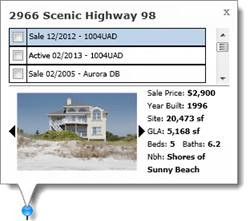How TOTAL handles comparable records.
This document explains how TOTAL handles duplicate comparables, and how TOTAL's Comps Database helps keep your reports consistent.
Document 6113 | Last updated: 02/15/2017 MJY
 By design, TOTAL’s Comps Database saves historical usage of comparable properties instead of overwriting the historical data with the most recent information. Saving the historical usage of a comp helps keep you consistent, and keeps that data at your fingertips.
By design, TOTAL’s Comps Database saves historical usage of comparable properties instead of overwriting the historical data with the most recent information. Saving the historical usage of a comp helps keep you consistent, and keeps that data at your fingertips.
TOTAL defines a comp as "a property with a specific condition, specific date, and for a specific assignment". While the physical address of a property rarely changes, its characteristics do change over time. Lets say, for example, you use a property as a comp with a specific set of characteristics in a 1004. Then, a few months later you use the same property as a comp with a different set of characteristics (the stucco was replaced with vinyl siding, a carport was added, etc) in another 1004. Because the data for the property was different between the two reports, TOTAL will consider it two different instances for the same address. In this case, overwriting comparable records with the newest information is detrimental, because the previous historical data is erased permanently.
By storing the historical usage of the property, you have an always up‑to‑date record of any changes that have occurred with that property. This helps you stay consistent with your comparable data and prevents erroneous data from being entered in your reports. TOTAL's SmartAddress tool does this for you by checking your comps database anytime you enter a complete address into the Sales Grid. For more information on this amazing time–saver, click here.